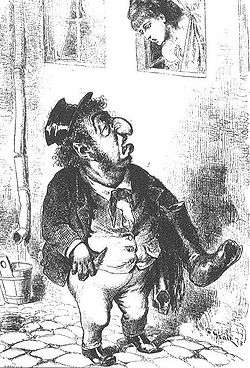Stereotypes of West and Central Asians in the United States
Stereotypes of Central and Western Asians in the United States are oversimplified generalizations against people from or with ancestry in Central Asia (including Afghanistan, Kazakhstan, Uzbekistan, and Kyrgyzstan) and Western Asia (including Palestine, Iraq, Qatar, Lebanon, Yemen, Kuwait, Israel, Saudi Arabia, Turkey, Jordan, Iran, Georgia, Azerbaijan, and Armenia). Stereotypes of Western Asians have a long history in the United States, although this had generally been limited to Jews up until the second half of the 20th century. In recent years, stereotypes of Arabs and Muslims have become more prevalent in Western countries, especially after 9/11. There have been hate crimes against people of Arab origin, who are mostly Muslims, in the USA.[1] Many people with Muslim names have been pulled out for questioning and searches due to passenger profiling at American airports.[2]
Central Asia, especially the Former Soviet-bloc, is often seen as a backwards region, where everyone lives on subsistence farming, and everyone has strange customs.
Semitic peoples
Arabs
In his essay "Arabs in Hollywood: An Undeserved Image", Scott J. Simon argues that of all the ethnic groups portrayed in Hollywood films, "Arab culture has been the most misunderstood and supplied with the worst stereotypes".
The American media stereotypes Arabs and Muslims as billionaires, belly dancers, bombers, and terrorists with little regard for human life, especially in the post-9/11 world.[3] Many movies feature Arab terrorist villains threatening to blow things up, including Black Sunday and Wanted: Dead or Alive. The stereotypical appearance of such Arabs includes beards and keffiyehs. The stereotype of the Arab billionaire may have its roots in the 1973 oil crisis. Arab women are usually portrayed as exotic belly dancers who are mute, subservient, and repressed. A number of American movies picture the U.S. military killing Arabs, such as Rules of Engagement, Iron Eagle, and Executive Decision.
Jews

Jewish people are sometimes stereotyped in media as cheap and greedy, with exaggerated Semitic physical features such as big, hooked noses, big lips, small eyes, black curly hair, and olive and/or brown-colored skin. Often, these stereotypes are based upon antisemitic canards—for instance, having dual loyalty, controlling certain institutions such as the media, being inherently evil, and possessing sexual perversion. Other stereotypes include the complaining and guilt inflicting Jewish mother stereotype, the spoiled and materialistic Jewish-American Princess and the Nice Jewish Boy.
In early films such as Cohen's Advertising Scheme (1904, silent) stereotyped Jews as "scheming merchants"[4]
Turkic peoples
Turkish
Turks are also depicted in similar fashion to Arabs in dress and writing and Turkey is portrayed as a theocratic country, due to the fact the majority of people in Turkey are practicing Muslims. However, Turkish is entirely unrelated to Arabic and today Turkish is written in the Latin alphabet that was introduced in 1928 and replaced the Arabic alphabet. The Turkish national dress also differs from Arabic national dresses. Today the Republic of Turkey is a staunchly secular state and has broadly borrowed politically, socially and culturally from the Western world.
Turkey is also mistakenly depicted as a desert dotted with date palms and camels, however Turkey has a diverse terrain, and deserts do not exist, and date palms and camels which are not native are very rare.[5]
In Turkey and in the Turkish diaspora, the film Midnight Express is commonly regarded as an expression of American anti-Turkish bias. Similarly, the Turkish government has repeatedly called recognition of the Armenian Genocide a form of racism motivated criticism targeting the "honor" of the Turkish people, which is illegal in Turkey.
See also
References
- ↑ "Hate crimes up in wake of terrorist attacks - CNN". Archives.cnn.com. 2001-09-16. Retrieved 2012-10-03.
- ↑ "Floridian: Assessing Arab-Americans' concerns". Sptimes.com. 2001-02-06. Retrieved 2012-10-03.
- ↑ "Arab Stereotypes and American Educators - American-Arab Anti-Discrimination Committee". Adc.org. Retrieved 2012-10-03.
- ↑ "The Movies and Ethnic Representation: Jews: Videotapes in the Media Resources Center, UC Berkeley". Lib.berkeley.edu. Retrieved 2012-10-03.
- ↑ "10 things to know about Turkey". Matador Network. 2010-04-14. Retrieved 2012-10-03.